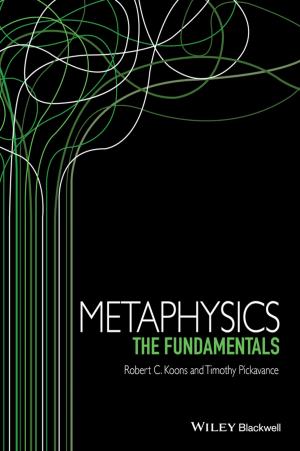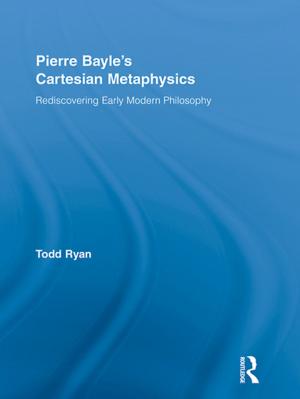The Logic of Truth
St. Thomas Aquinas's Epistemology and Antonio Livi's Alethic Logic
Nonfiction, Religion & Spirituality, Philosophy, Epistemology, Modern, Metaphysics| Author: | William J. Slattery, Ph.D., S.T.L. | ISBN: | 1230001598063 |
| Publisher: | Leonardo da Vinci | Publication: | February 1, 2016 |
| Imprint: | Language: | English |
| Author: | William J. Slattery, Ph.D., S.T.L. |
| ISBN: | 1230001598063 |
| Publisher: | Leonardo da Vinci |
| Publication: | February 1, 2016 |
| Imprint: | |
| Language: | English |
The “Dictatorship of Relativism”, the dominant culture of the post-modern world with its ideological roots in the Cartesian, Protestant, and French revolutions, is ultimately a revolt against Truth. It argues that man is incapable of knowing reality as reality but merely as physical-mathematical appearance; that unrestrained individualism, checked only by social consensus, is the essence of freedom and the standard for moral decisions; and that the most important truths – those regarding God and eternal salvation – are unknowable.
To defend Truth against this tyranny is to shield the very structure of logic, the meaning of language, the standards of beauty, the nature of love, and the divinely revealed doctrines of the Catholic Faith.
The Logic of Truth confronts the epistemological foundations on which relativism is built. It achieves this through its presentation of Antonio Livi’s alethic logic in the light of the theory of knowledge of St. Thomas Aquinas. Livi, a disciple of Etienne Gilson and Cornelio Fabro, has created an original alethic logic by undergirding elements of Anglo-American analytic philosophy with the presuppositions of St. Thomas’s metaphysical theory of cognition. The Logic of Truth shows both the coherence of Livi’s logic with St. Thomas’s metaphysical gnoseology as well as the unsurpassed complexity of the latter’s probing of man’s natural ability to grasp reality.
Slattery argues that the combined thought of St. Thomas and Livi is a compelling way to argue for the validity of immediate realism and the existence of absolute truths intrinsic to the structure of the human mode of knowing. Moreover, his conclusions imply the logical incoherence of the philosophies of Descartes, Kant, Hegel, and the anti-realist Transcendental “Thomism” that epistemologically precludes the metaphysics of being and thereby the rational foundations of Catholic theology.
“Some Italian scholars…have already tried to give a synthetic overview of my philosophy of alethic logic. William Slattery is the first non-Italian scholar to do so, and I sincerely think that his attempt is the best, both for completeness and intellectual depth…”.
‒ Msgr. Antonio Livi, Dean Emeritus of the Faculty of Philosophy, Lateran University, Rome.
"Fr. William J. Slattery gives us a clear, rigorous, deep, and complete study of the questions raised by one of the most interesting philosophical currents of our times..." ‒ Professor Dario Sacchi, Catholic University of the Sacred Heart, Milan.
“The alethic logic of Livi and Slattery is unique, based explicitly on sound philosophical analyses. The Logic of Truth, I believe, will reward the reader with important insights in the tradition of the ‘greater’ logic. ‒ Dr. Walter B. Redmond, philosopher, Austin, Texas.
“Readers will better understand the relevance of Livi’s philosophy thanks to The Logic of Truth placing it in its historical context and by its analysis of the chief objections raised against it. Furthermore, Slattery succeeds in the gigantic task of thoroughly comparing Livi's alethic logic with Aquinas’s theory of knowledge, something that others had only partially done. This was long overdue, and Slattery accomplishes it with analytic depth and great accuracy, providing us with an excellent tool not only to introduce us to Livi's philosophy, but also to render explicit St. Thomas’s position vis-à-vis critical realism.”
‒ Professor Thomas Rego, Catholic University of La Plata, Argentina.
The “Dictatorship of Relativism”, the dominant culture of the post-modern world with its ideological roots in the Cartesian, Protestant, and French revolutions, is ultimately a revolt against Truth. It argues that man is incapable of knowing reality as reality but merely as physical-mathematical appearance; that unrestrained individualism, checked only by social consensus, is the essence of freedom and the standard for moral decisions; and that the most important truths – those regarding God and eternal salvation – are unknowable.
To defend Truth against this tyranny is to shield the very structure of logic, the meaning of language, the standards of beauty, the nature of love, and the divinely revealed doctrines of the Catholic Faith.
The Logic of Truth confronts the epistemological foundations on which relativism is built. It achieves this through its presentation of Antonio Livi’s alethic logic in the light of the theory of knowledge of St. Thomas Aquinas. Livi, a disciple of Etienne Gilson and Cornelio Fabro, has created an original alethic logic by undergirding elements of Anglo-American analytic philosophy with the presuppositions of St. Thomas’s metaphysical theory of cognition. The Logic of Truth shows both the coherence of Livi’s logic with St. Thomas’s metaphysical gnoseology as well as the unsurpassed complexity of the latter’s probing of man’s natural ability to grasp reality.
Slattery argues that the combined thought of St. Thomas and Livi is a compelling way to argue for the validity of immediate realism and the existence of absolute truths intrinsic to the structure of the human mode of knowing. Moreover, his conclusions imply the logical incoherence of the philosophies of Descartes, Kant, Hegel, and the anti-realist Transcendental “Thomism” that epistemologically precludes the metaphysics of being and thereby the rational foundations of Catholic theology.
“Some Italian scholars…have already tried to give a synthetic overview of my philosophy of alethic logic. William Slattery is the first non-Italian scholar to do so, and I sincerely think that his attempt is the best, both for completeness and intellectual depth…”.
‒ Msgr. Antonio Livi, Dean Emeritus of the Faculty of Philosophy, Lateran University, Rome.
"Fr. William J. Slattery gives us a clear, rigorous, deep, and complete study of the questions raised by one of the most interesting philosophical currents of our times..." ‒ Professor Dario Sacchi, Catholic University of the Sacred Heart, Milan.
“The alethic logic of Livi and Slattery is unique, based explicitly on sound philosophical analyses. The Logic of Truth, I believe, will reward the reader with important insights in the tradition of the ‘greater’ logic. ‒ Dr. Walter B. Redmond, philosopher, Austin, Texas.
“Readers will better understand the relevance of Livi’s philosophy thanks to The Logic of Truth placing it in its historical context and by its analysis of the chief objections raised against it. Furthermore, Slattery succeeds in the gigantic task of thoroughly comparing Livi's alethic logic with Aquinas’s theory of knowledge, something that others had only partially done. This was long overdue, and Slattery accomplishes it with analytic depth and great accuracy, providing us with an excellent tool not only to introduce us to Livi's philosophy, but also to render explicit St. Thomas’s position vis-à-vis critical realism.”
‒ Professor Thomas Rego, Catholic University of La Plata, Argentina.















